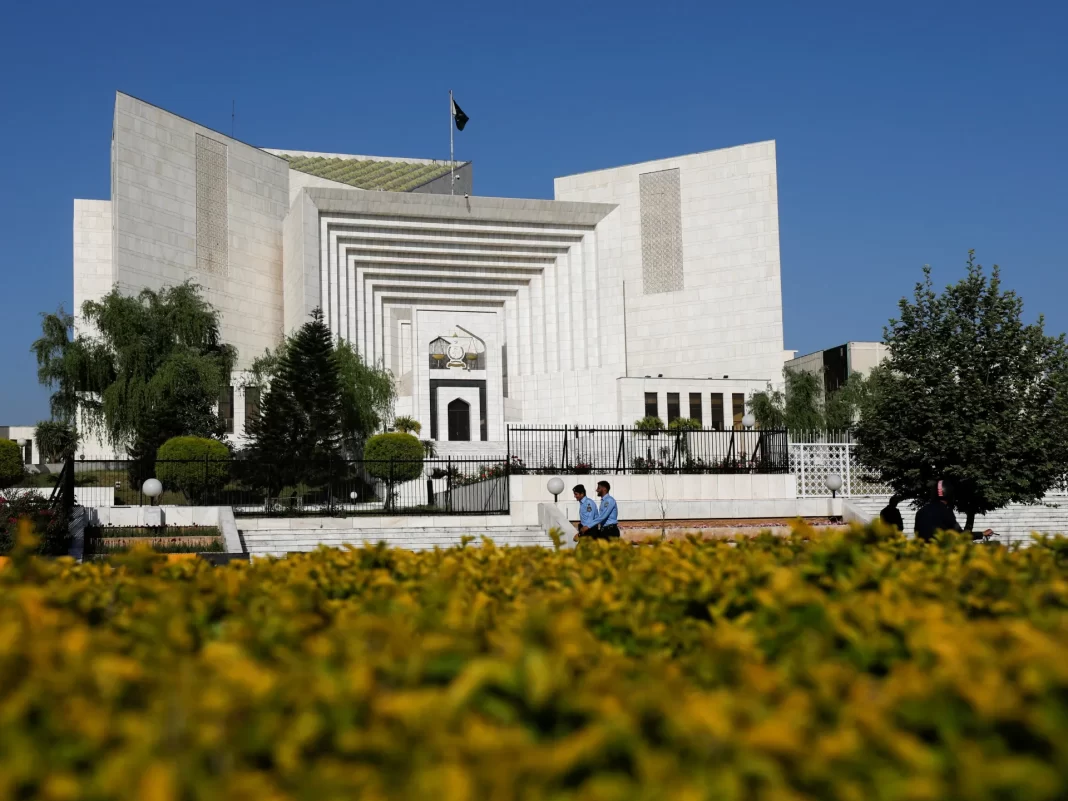On Monday, Justice Muhammad Ali Mazhar raised some eyebrows regarding the assertion that transferring three provincial high court judges to the Islamabad High Court (IHC) was an executive overreach into judicial matters. He pointed out that each transfer had received the green light from four different judges.
Judges of the Supreme Court’s constitutional bench (CB), who were hearing petitions against the transfers and the subsequent adjustments to the IHC judges’ seniority list, expressed concerns that the executive had kept the chief justices of Pakistan and the respective high courts in the dark about the seniority situation. On that day, a five-member CB, led by Justice Mazhar, took up the judges’ transfer case.
During the proceedings, Faisal Siddiqi, representing the Karachi Bar, argued that the IHC was set up under Article 175 of the Constitution, which only pertains to provincial matters regarding judge appointments.
He contended that judges shouldn’t be transferred to the IHC, and even if such a transfer were to happen, it shouldn’t be permanent, nor would a new oath be necessary when that judge returns to their original high court. Justice Mazhar inquired whether Article 200 had lost its effectiveness with the introduction of Article 175-A. Siddiqi replied that the current transfer system undermines the authority of the Judicial Commission of Pakistan (JCP), which goes against the Constitution’s intent.
Siddiqi emphasized that seniority is built over many years, and altering it overnight through executive actions is a move toward authoritarianism.
Justice Mazhar highlighted that the transfer process requires approvals at four levels: the chief justice of the relevant high court, the chief justice of the receiving high court, the judge being transferred, and finally, the chief justice of Pakistan.
“If any one of them refuses, the transfer cannot proceed. If the process were in the hands of the executive, it would be a different matter, but here it requires the approval of four judicial forums.”
Siddiqi informed the court that the transfer was executed in bad faith, leaving the judiciary unaware of the sensitive seniority issue.
Attorney-General for Pakistan (AGP) Mansoor Awan contended that according to Article 200, judges can be transferred either permanently or temporarily. The notification mentions a temporary transfer, which comes with extra benefits, while a permanent transfer grants the judge an official residence.
Justice Shakeel Ahmed raised a question about whether the law secretary should be the one deciding on the judges’ oaths and seniority. He inquired if anyone had consulted the law secretary regarding this issue. “Why did the law secretary feel the need to add clarifications on seniority and oath in the final summary?”
He pointed out that the law secretary’s need to clarify that judges who are transferred don’t have to take a new oath is concerning. The Supreme Court then decided to adjourn the hearing until today (Tuesday).
For the latest updates and insights on new developments, visit the NEWSON
Q1: What is the core issue being addressed by the Supreme Court?
The Supreme Court’s constitutional bench is reviewing petitions against the transfer of three provincial high court judges to the Islamabad High Court (IHC) and the resulting changes to the seniority list.
Q2: Why is there controversy over the judges’ transfers?
Concerns have been raised that the executive may have bypassed or excluded the chief justices of Pakistan and the respective high courts from the seniority decision-making process. Critics argue this undermines judicial independence.
Q3: What was Justice Mazhar’s stance?
Justice Muhammad Ali Mazhar emphasized that the transfers were approved by four judicial forums, not the executive alone, countering the claim of executive overreach.
Q4: Who approves a judge’s transfer?
The transfer must be approved by:
-
The chief justice of the originating high court
-
The chief justice of the receiving high court
-
The judge being transferred
-
The chief justice of Pakistan
Q5: What argument did lawyer Faisal Siddiqi make?
Siddiqi argued that the IHC is not equivalent to a provincial high court, so transfers to it should not be permanent. He also stated that such transfers could undermine the role of the Judicial Commission of Pakistan (JCP) and violate the spirit of the Constitution.
Q6: What did the Attorney-General say in defense of the transfers?
AGP Mansoor Awan argued that Article 200 allows for both temporary and permanent transfers, and the current notifications involved temporary transfers with associated benefits.


